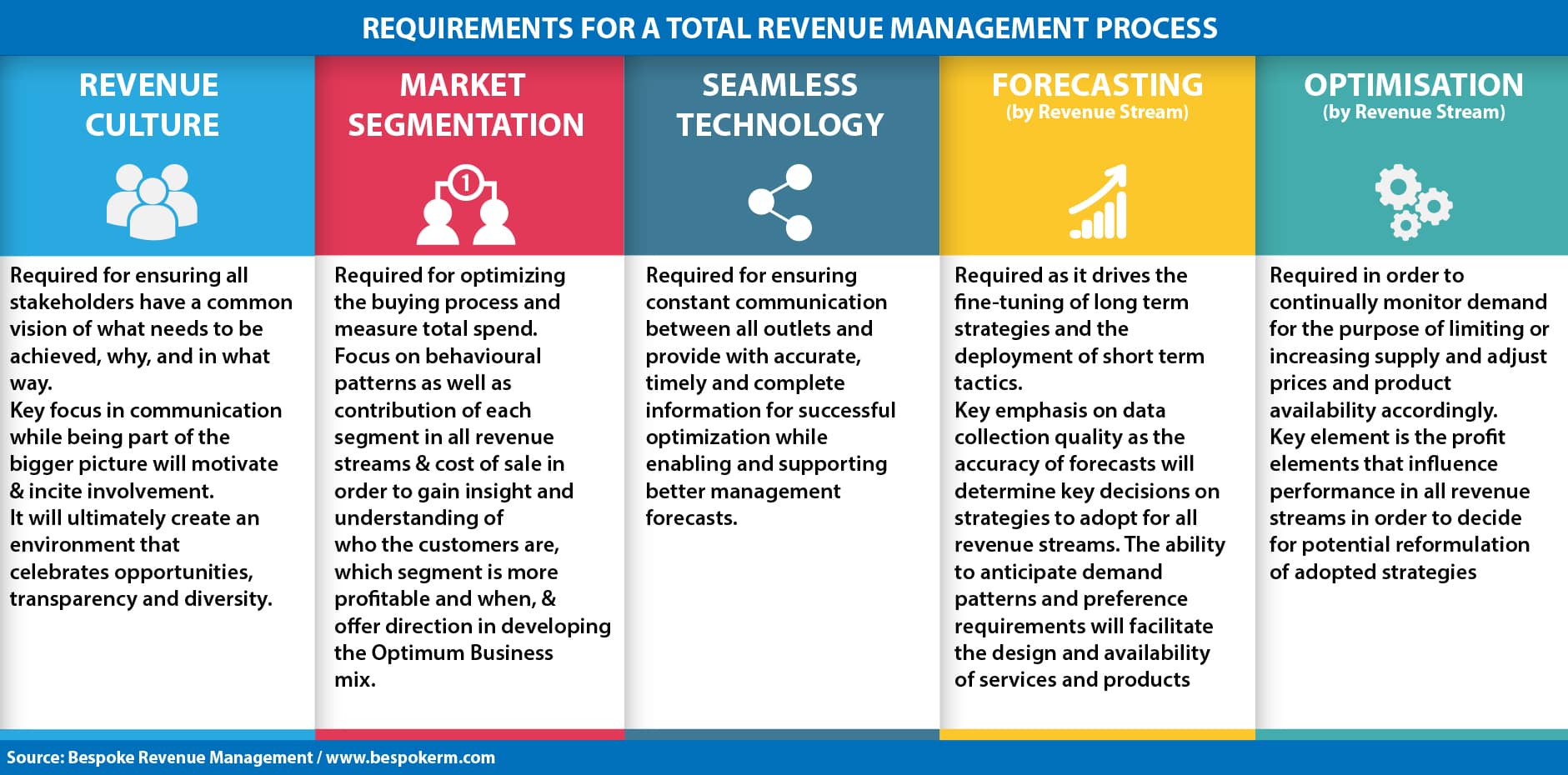Total Revenue Management: How Hotels Can Maximize Their Revenue Total Revenue Management: How Hotels Can Maximize Their Revenue
text
Total revenue management can broadly be defined as the goal to manage each revenue source to the highest profitability. By incorporating multiple revenue points-of-sale like food and beverage, banqueting and conferencing facilities, spa, retail, leisure activities and others with room revenue management, total revenue management assists hotels in achieving their goal of increasing revenue and profitability in a competitive market.
Total Revenue Management is Here to Stay
Traditionally, hotel revenue management has always been primarily focused on optimizing and maximizing room revenue. For close to a decade, the importance of incorporating all revenue streams within revenue management has been a much talked about topic in hospitality forums. So why such little progress? What are the hurdles and obstacles? Some would say, lack of technologies and systems, while others would attribute it to the lack of knowledge and skills.
Well, those days are gone! There have been path-breaking initiatives in the hotel tech space. Our hotel revenue executives now have the right tools in their armoury to assist them in making well-informed decisions.
Hotels are now surveying different avenues to generate additional monies even during low-occupancy times. We, therefore, see a substantial modification in strategies that include total revenue management. Total revenue management has evolved into devising pricing strategies that optimize the total revenue performance of the hotel.
Simultaneously measuring corresponding links across revenue streams to package services or rates to elevate a hotel’s total profit margin is the main ethos of total revenue management. E.g., a casino hotel regularly comps off room nights for high-rolling guests; this is because they have measured the cost of the room is far less than the amount of the bets placed!
A more straightforward tactic is upselling; an upsell to the next room category will increase ADR while also allowing you to resell the lower room category. In the off-peak times, offer discounted spa treatments to increase the turnover and boost footfalls when you generally would not have the business.
The Advantages of Total Revenue Management
A well-rounded total revenue management strategy can help hotels achieve increased profitability, reduced costs, better alignment between departments and improved cluster/portfolio performance. Below you find a sum-up of all benefits.
- Increased revenues: Food & beverage and ancillary revenues are almost always kept on the backburner when managing revenues. By adopting a total revenue management strategy, hotels can guarantee that strategic decisions impact all aspects of revenue in the hotel.
- Reduced costs: Not all income is similar in terms of profit margins. With a total revenue management approach, hotels can manage staffing, purchasing and fixed costs.
- Cohesive workforce: Total revenue management approach brings all departments together to achieve a single goal; increased profitability. By breaking this goal down into smaller quantifiable goals relevant to each department, the entire staff is energized to achieve their targets.
- Asset optimization: Like rooms, banquet spaces, restaurant seats, spa treatment rooms are perishable. When there is a unified approach to fill these seats in “dead time zones”, hotels benefit by optimizing these spaces.
- Increased productivity: When revenues are increasing, and costs are decreasing, the results are immediately visible in the bottom line.
- Improved group operations: By carrying out total revenue management across the portfolio, management displays better performances, solidifying their efforts to increase brand presence.
5 Tips to Successfully Implement Total Revenue Management
Adopting total revenue management does not necessarily have to take an enormous amount of effort or the formation of performance improvement teams to establish total hotel revenue management concepts. Here are five easy steps to help you in the initial stages of your journey:
- Adopt a total revenue management mentality in each decision-making, planning, meetings, and performance reviews.
- Train and educate all stakeholders in the hotel on the importance of total revenue management, its expectations and the successes that can be achieved.
- Apply revenue management strategies and practices, to all applicable departments.
- Establish a system and techniques to guide decisions that generate maximum revenue and profitability for the entire hotel.
- Invest and/or implement systems, tools, and metrics for tracking, reporting, and forecasting revenue at the department and property levels.
Total Revenue Management for All Type of Properties
Total revenue management can be used for all types of properties, small or large, chain or independent, leisure or business-centric. You need to identify what the market segment you are catering to is? What does your customer want? Analyze your booking and source data and listen to the voice of the customer. Tailor-make packages that distinguish the requirements of a business or leisure guest will help increase profitability and increase guest satisfaction.
Total revenue management strategies can also help in addressing a need or solving a problem. Are your spa therapists not too busy during specific periods of the day and eventually must refuse appointments during peak times? Offer a special “down-time discount” for the quiet hours.
KPI’s Used in Total Revenue Management
An essential element of total revenue management is to adopt quantifiable performance metrics. Some important KPIs to track for a holistic hotel revenue performance are:
ROOMS:
- Total Revenue Per Available Room (TRevPAR)
- Gross Operating Profit Per Available Room (GOPPAR)
- Customer Acquisition Cost (CAC)
- Customer Lifetime Value (CLV)
FOOD & BEVERAGE POINTS OF SALE:
- Revenue Per Available Seat Hour (RevPASH)
- Profit Per Available Seat Hour (ProPASH)
- Residential vs Non-residential Revenue
MEETING AND CONFERENCE FACILITIES:
- Revenue Per Available Square Foot/Meter (RevPAF/M)
- Revenue Per Attendee (RevPA)
- Attendee Density
- Inquiry Conversion Performance
SPA:
- Revenue Per Available Treatment Hour (RevPATH)
To sum up, Total revenue management is not about looking at each line of business individually, but as a collective package of opportunities to forecast and optimally price. To succeed, hotels must be prepared to break down silos, think in creative and radical new ways about day-to-day hotel operations and take confident, strategic actions.




